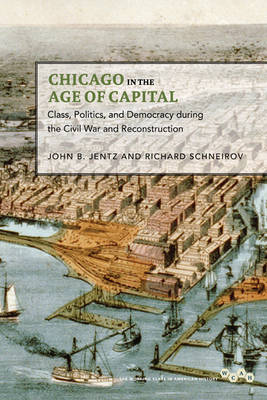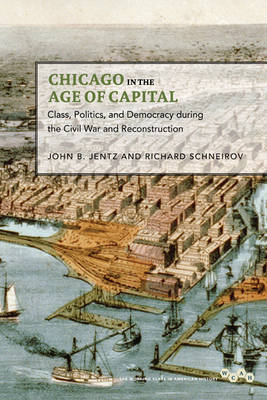
Bedankt voor het vertrouwen het afgelopen jaar! Om jou te bedanken bieden we GRATIS verzending (in België) aan op alles gedurende de hele maand januari.
- Afhalen na 1 uur in een winkel met voorraad
- In januari gratis thuislevering in België
- Ruim aanbod met 7 miljoen producten
Bedankt voor het vertrouwen het afgelopen jaar! Om jou te bedanken bieden we GRATIS verzending (in België) aan op alles gedurende de hele maand januari.
- Afhalen na 1 uur in een winkel met voorraad
- In januari gratis thuislevering in België
- Ruim aanbod met 7 miljoen producten
Zoeken
Chicago in the Age of Capital
Class, Politics, and Democracy During the Civil War and Reconstruction
John B Jentz, Richard Schneirov
€ 62,95
+ 125 punten
Uitvoering
Omschrijving
In this sweeping interpretive history of mid-nineteenth-century Chicago, historians John B. Jentz and Richard Schneirov boldly trace the evolution of a modern social order. Combining a mastery of historical and political detail with a sophisticated theoretical frame, Jentz and Schneirov examine the dramatic capitalist transition in Chicago during the critical decades from the 1850s through the 1870s, a period that saw the rise of a permanent wage worker class and the formation of an industrial upper class. Jentz and Schneirov demonstrate how a new political economy, based on wage labor and capital accumulation in manufacturing, superseded an older mercantile economy that relied on speculative trading and artisan production. The city's leading business interests were unable to stabilize their new system without the participation of the new working class, a German and Irish ethnic mix that included radical ideas transplanted from Europe. Jentz and Schneirov examine how debates over slave labor were transformed into debates over free labor as the city's wage-earning working class developed a distinctive culture and politics. The new social movements that arose in this era--labor, socialism, urban populism, businessmen's municipal reform, Protestant revivalism, and women's activism--constituted the substance of a new post-bellum democratic politics that took shape in the 1860s and '70s. When the Depression of 1873 brought increased crime and financial panic, Chicago's new upper class developed municipal reform in an attempt to reassert its leadership. Setting local detail against a national canvas of partisan ideology and the seismic structural shifts of Reconstruction, Chicago in the Age of Capital vividly depicts the upheavals integral to building capitalism.
Specificaties
Betrokkenen
- Auteur(s):
- Uitgeverij:
Inhoud
- Aantal bladzijden:
- 310
- Taal:
- Engels
- Reeks:
Eigenschappen
- Productcode (EAN):
- 9780252036835
- Verschijningsdatum:
- 2/04/2012
- Uitvoering:
- Hardcover
- Formaat:
- Genaaid
- Afmetingen:
- 160 mm x 236 mm
- Gewicht:
- 639 g

Alleen bij Standaard Boekhandel
+ 125 punten op je klantenkaart van Standaard Boekhandel
Beoordelingen
We publiceren alleen reviews die voldoen aan de voorwaarden voor reviews. Bekijk onze voorwaarden voor reviews.









